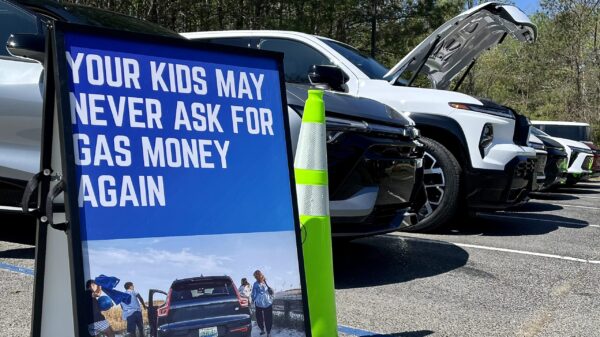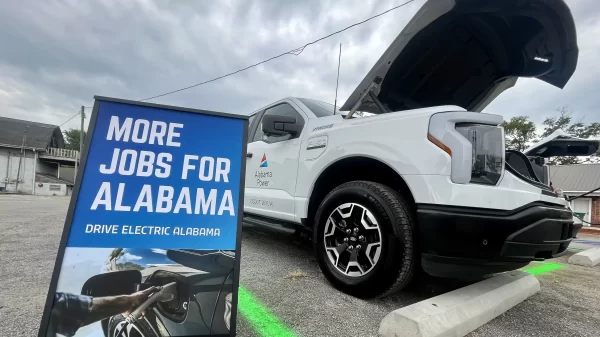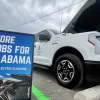|
Getting your Trinity Audio player ready...
|
“The need to transition to a clean energy economy should provide a win‑win opportunity for auto companies and unionized workers.” That was President Biden’s pitch to the United Auto Workers and the Big Three auto companies (GM, Ford, and Stellantis) in the midst of their contract negotiations in August 2023. As the administration rolled out billions of dollars in the form of loans and grants for new electric vehicle factories in the south, the Biden administration gave verbal assurances that the clean vehicle transition would not, should not, and does not have to come at the expense of good union jobs. However, massive commitments, such as a $9.2 billion loan for Ford’s factories in Tennessee and Kentucky, came with no strings attached regarding labor protections. Thanks to this influx of federal money, Tennessee, along with Alabama and Georgia, have been at the forefront of the EV manufacturing boom.
At the same time, state-level Republicans and their legislation mill at the American Legislative Exchange Council (ALEC) were busy drafting and codifying laws to ensure that any unionization drives faced an uphill battle. These efforts, in conjunction with an impending Republican majority on the NLRB and Trump’s day one roll back of electric vehicle spending and targets, spell trouble for hopes of a “win-win” transition for union workers.
Backend Protections For Stringless Federal Money
The flow of federal funds to southern states has come in the form of both loans like Ford’s deal and direct grants to states for new infrastructure. Tennessee and Alabama are the beneficiaries of $88 million and $79 million, respectively, through the Bipartisan Infrastructure law and its National Electric Vehicle Infrastructure (NEVI) program. Georgia received the eighth most of any state with nearly $135 million in NEVI funds. This was complemented by a $6.6 billion loan in November for a new plant in Georgia operated by EV manufacturer Rivian, which just announced a joint venture with Volkswagen.
Though these federal funds did not always include provisions that guaranteed high wages and benefits, concurrent work at the NLRB set the stage for better working conditions through swifter, fairer unionization efforts. The Board regularly took pro-union stances through rulemaking and precedent setting, none more consequential than its Cemex ruling.
On August 25, 2023, the Board determined that if, in the run-up to an NLRB election, a company engaged in unfair labor practices, the employer would be forced to recognize the union and begin bargaining. It was a landmark decision that discouraged union busting tactics in the interim period after workers signed union authorization cards and employers demanded an NLRB-supervised election.
For workers and unions, this was a boon. The burden was now on the employer to petition the NLRB for a “secret ballot” election, wherein workers vote in a NLRB-conducted election even if a majority already signed union cards, if the company did not opt for voluntary recognition. Employers could no longer use underhanded tactics to dissuade a pro-union vote and escape with slaps on the wrist. To business interest, this was an existential threat to their ability to maintain non-union, and therefore low quality, workplaces.
Republican State Legislatures Fight Back with ALEC’s Help
Enter ALEC, a right wing policy center that churns out bills for Republican state legislatures to cut and paste into the law books. Reporting in the 2010s exposed the far reaching tentacles of the operation, yet the group remains a state-level bulwark against achievements on behalf of workers or consumers.
Just three days after the NLRB issued its ruling, Republican legislatures had their answer to Cemex. On August 28, 2023, ALEC finalized its Taxpayers Dollars Protect Workers Act, a model policy that, “requires employers receiving taxpayer-funded economic incentives to […] use the secret ballot in unionization elections as a condition of receiving those incentives.”
The model bill is effectively a plagiarized version of Tennessee House Bill 1342, which was signed into law in May 2023. Representative Chris Todd and Senator Ed Jackson, the two ALEC state chairs for Tennessee, cosponsored the bill. After ALEC instituted some minor edits to the Tennessee version, the model bill spread to Alabama and Georgia, using much of the ALEC language verbatim. Senator Dan Roberts, ALEC’s Alabama state chair, and Senators John Albers and Steve Gooch, ALEC’s Georgia state chairs, co-sponsored the respective state bills.
Bust a Union, Earn a Tax Break
These state laws are not merely symbolic. On top of free flowing federal money, auto manufacturers have extracted billions from southern states in the form of tax breaks and other economic incentives. Mercedes-Benz has benefitted from $372 million in incentives from Alabama since 1993. Georgia crafted a sweetheart deal to entice Hyundai, providing a whopping $2.1 billion in incentives, largely through tax breaks, but also $2.75 million in cash. A Volkswagen plant in Chattanooga received $577 million in incentives from Tennessee. Any threat to these deals, or the prospects of future tax breaks, will undoubtedly impact the calculus of these companies moving forward.
Disincentivizing voluntary recognition also gives ample time for companies and officials to propagandize against unionization efforts. Lawmakers have been explicit in this intention.
“We have worked tirelessly on behalf of our constituents to bring good-paying jobs to our states,” wrote the Governors of Alabama, Georgia, and Tennessee, among others. “Unionization would certainly put our states’ jobs in jeopardy.” This is a thinly veiled threat to both workers and the companies: unionization puts state economic incentives, and therefore jobs, at risk.
At the Mercedes-Benz EV plant, anti-labor threats broke through, as 54 percent of workers voted against unionization last May. Far from voluntary recognition, the company spent the lead up to the NLRB secret-ballot election fearmongering about the UAW. Alabama’s generous tax breaks gave them ample financial incentive to do so. While the state law would only affect incentives beginning in 2025, the company certainly listened to the preferred outcomes from top officials who could influence future tax breaks.
The proof is in Governor Ivey’s own words—she touted the law’s influence just before the election and celebrated the company’s successful anti-union push afterwards. The UAW does have a pending complaint with the NLRB alleging unfair labor practices throughout the process, which would mandate union recognition. Nonetheless, Mercedes has evidently proven its fealty to lawmakers: in November, Tuscaloosa approved an additional $1.3 million in tax incentives for a new logistics facility.
The Outlook for the Second Trump Administration
The odds are clearly stacked against organized labor, but that has not stopped them amassing hard fought wins throughout the region.
In Alabama, workers at New Flyer’s electric bus plant joined the Communications Workers of America. The UAW organized workers at two plants in Tennessee, one operated by Volkswagen in Chattanooga, the other a joint venture between General Motors and LG Energy in Spring Hill. In Georgia, the United Steelworkers succeeded in a three-year fight to unionize a Blue Bird factory that manufactures electric school buses.
Unions have also announced plans to organize a Hyundai factory in Savannah that will be fully operational in 2025, along with ongoing UAW efforts at an Alabama Hyundai plant and a Missouri Toyota plant. The UAW reportedly reached a deal with Rivian for the company to remain neutral in future organizing campaigns if and when the company becomes profitable, though the exact details of the agreement are not public.
It remains to be seen how these efforts will fare over the next four years given Trump’s hostility to both EV funding and unions. As a case in point, Trump used his first day in office to revoke a Biden executive order that set a nonbinding target to have electric vehicles account for 50 percent of U.S. car sales by 2030. Trump also halted expenditures of federal funds for EV charging infrastructure.
To be sure, EV manufacturing will continue in the south—billions of dollars are already out the door, regardless of how the Trump administration handles the outstanding funds. Unions also will not give up on those workers—but they will be losing their biggest federal ally.
With Senate Democrats failing to secure an NLRB majority through 2026, the Cemex ruling, pending allegations of ULPs, and future unionization efforts are at risk. To make matters worse, Republicans at the federal level may go even further than their state-level counterparts. Project 2025 calls for Congress to mandate secret ballot elections, regardless of financial incentives, meaning companies would no longer even have the option to voluntarily recognize their employees’ unions. This means extended election periods, more opportunities for union busting, and more unpunished unfair labor practices—all overseen by an unsympathetic arbiter in the Trump-era NLRB.
It’s a grim reality compared to Biden’s shiny vision of a clean energy economy powered by union workers. Companies in Republican-controlled states now have hundreds of millions of reasons to fight tooth and nail against unionization, knowing they have lawmakers in their corner at every level and a Republican NLRB that is unlikely to stand in their way.






















































